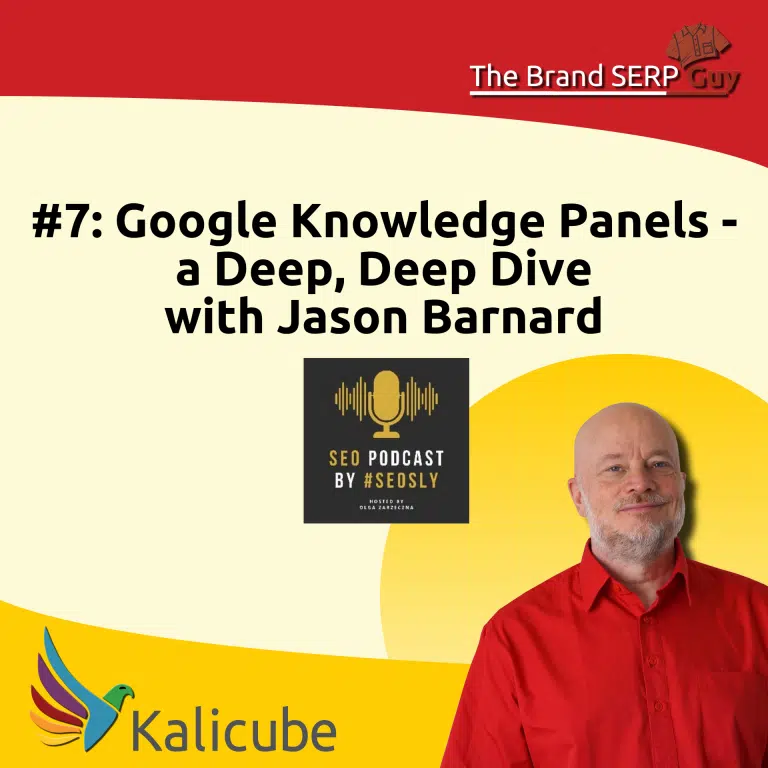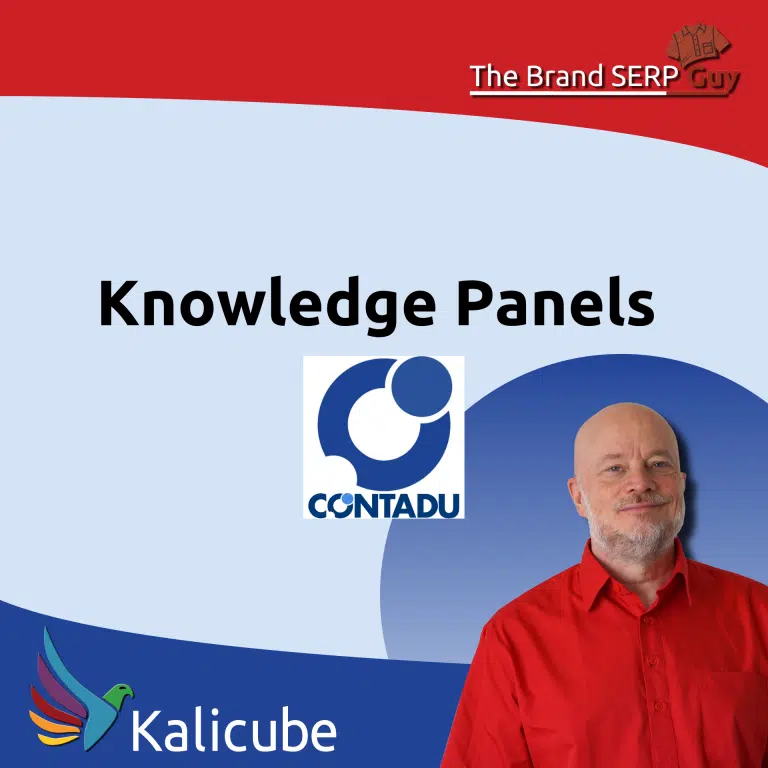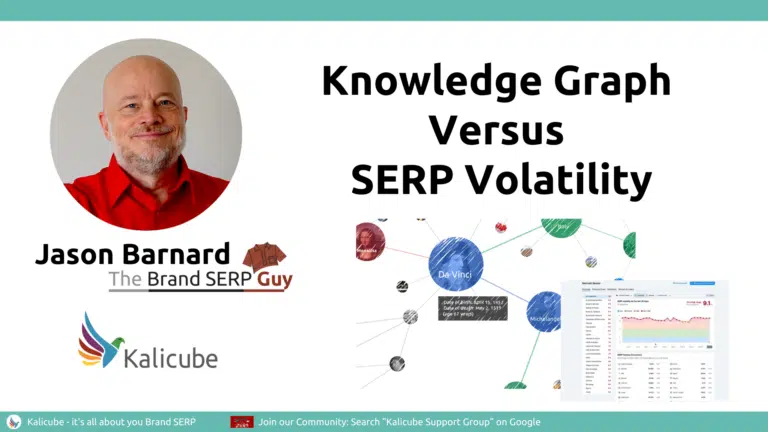This is the 2nd episode of our 3-part series, and we’re still talking about why only the strongest survive in the search game. Joining us is Jason Barnard, who is an author, speaker and consultant at Kalicube. Kalicube is a groundbreaking digital marketing agency that pioneered the concept of exact match brand service. Yesterday, Jason and I talked about the concept of SERP, owning your name in the eyes of Google and the rest of the world. And today, we’re going to talk about Knowledge Panels.
Introducing the Knowledge Panel Expert: Jason Barnard (The Brand SERP Guy)
[00:00:00] Benjamin Shapiro: Welcome to the Voices of Search podcast. I’m your host, Benjamin Shapiro. And today we’re going to talk about why only the strongest survive in the search game. Joining us is Jason Barnard who is an author, speaker and consultant at Kalicube, which is a groundbreaking digital marketing agency that pioneered the concept of exact match Brand SERPs.
[00:00:19] Benjamin Shapiro: Yesterday Jason and I talked about the concept of Brand SERPs, owning your name in the eyes of Google and the rest of the world. And today we’re going to talk about Knowledge Panels. This podcast is brought to you by Previsible. Look, I’ve been doing the Voices of Search podcast for about four years now and if I know anything, it’s how to spot a good SEO.
[00:00:40] Benjamin Shapiro: So, let me introduce you to the people that taught me everything I know about SEO. Now, if you’ve been listening to the Voices of Search podcast for a while, you probably already know Jordan Koene and Tyson Stockton as friends and regular guests on this podcast, but they’re also the co-founders of Previsible. Previsible’s mission is to provide SEO consulting and cutting edge SEO educational tools that help global brands to execute their online search strategies to generate meaningful traffic and results. They provide solutions and resources that enable their clients to embrace SEO at an organisational level that can empower SEO teams to expand their resources, to scale organic growth, and they always bring the expertise and credibility that will help you work with your leadership to appropriately prioritize your organic growth goals.
[00:01:31] Benjamin Shapiro: Now, whether your organisation needs support with organic growth consulting, organisational education, or just the gravitas to make SEO a priority, Jordan and Tyson from Previsible will help your company navigate the evolving search landscape and embrace SEO. But before we get to today’s interview, I want to tell you about a new show that my company is launching. It’s called The Revenue Generator Podcast. Okay, on with the show. Here’s the second part of my conversation with Jason Barnard, author, speaker, consultant at Kalicube. Jason, welcome back to the Voices of Search podcast.
[00:02:06] The Brand SERP Guy (Jason Barnard): Thank you very much. Absolutely delightful to be back.
[00:02:09] Benjamin Shapiro: Excited to have you back on our show. We had a great conversation about Brand SERPs, about owning your name, understanding the value in not only Google’s eyes but in your leads, your prospects, and your customers’ eyes and how important it is to have your name show up first.
[00:02:26] The Brand SERP Guy (Jason Barnard): Yep. That was a really interesting conversation yesterday.
What is a Knowledge Panel?
[00:02:29] Benjamin Shapiro: I enjoyed it. I mean, other than the part where we had to talk about the other Ben Shapiro and how, when people search for my name, somebody else shows up. That was a little frustrating, but that’s neither here nor there. Today, I want to talk to you a little bit about Knowledge Panels. So, let’s start off, give me the definition of what you consider to be a Knowledge Panel.
[00:02:47] The Brand SERP Guy (Jason Barnard): Oh that’s pretty easy. On desktop, it’s on the right-hand side. What we call the right for rail. I hadn’t heard that term until I talked to Nathan Chalmers at Bing. I did a series of interviews with team leads at Bing, which was incredibly informative because where is the Google team leads? People like Gary Illyes and John Mueller don’t share very much. They tend to be quite cagey. The people at Bing are very, very open, so I did a series of five or six interviews with people at Bing and they said absolutely love Nathan Chalmers is the whole page algorithm guy, which is phenomenally interesting and we’ll talk about that in the next interview because we’re going to be talking about Darwinism in Search which is phenomenally interesting and mind blowing. And he was talking about the right rail. Now the right rail, we can consider it to be what Bing and Google considered to be fact, so you’re going to have Google my business. In the case of Google, you’re going to have Knowledge Panels, you’re going to see results about. These are things that Google perceives as fact, the derive that in the Knowledge Graph or in it’s, I call it the yellow pages business directory, which is Google My Business.
Google My Business is not a Knowledge Panel, It’s a Business Listing
[00:03:55] The Brand SERP Guy (Jason Barnard): Google My Business is not the Knowledge Graph. It’s a business listing. It’s as simple as that. But on the right hand side, we say, this is fact, and on the left-hand side, we say, this is our best guests, our advice, our recommendation, and that distinction is very, very important. So, the Knowledge Panel, what you will notice, the Knowledge Panel has the little share icon. It’s a little three dots with little lines joining them up. That’s how you recognise the Knowledge Panel. And that means that Google has understood this information independently of the source itself and understands it to be fact. Whereas Google My Business is obviously information that’s fed into Google by the business itself. And the distinction is very, very, very important because if we’re looking at entity-based search, Google needs to understand who you are, what you do, and who your audience is. And that’s the single, fundamental, most important thing you need to focus on today so that your strategy will function tomorrow. If Google doesn’t understand who you are, what you do, and who your audience is, how can it possibly start to imagine recommending your offers as a solution to its users.
To Actually Trigger That Knowledge Panel, You Need to Make Sure Google Understands Who You Are, What You Do, and Who Your Audience Is
[00:05:13] Benjamin Shapiro: So, you mentioned that the Knowledge Panels, essentially what Google considers to be facts, and then sometimes they’re for business listings pulling the Google My Business data, it also means that Google is making some assumptions about what your keyword is. I’ll go back to the example we used yesterday, my name. There’s another Ben Shapiro. He’s a political commentator. And when you search Benjamin Shapiro, where my website is the second organic listing on the page, we have Wikipedia showing up first with the other Ben Shapiro, Benjamin Shapiro, but his Knowledge Graph shows up on that page. How do you get a Knowledge Graph? How do I bump him out of this top spot?
[00:05:51] The Brand SERP Guy (Jason Barnard): Well, that’s a very good question from the point of view. So far, it only has a Knowledge Graph to Ben Shapiro, the American commentator. So, it doesn’t have a choice. It doesn’t have anything else to offer. If you want it to offer you as a possibility for Benjamin Shapiro, you do need to get that Knowledge Panel, so you do need to get into the Knowledge Graph. And from that point of view, it’s both simple and complicated at the same time. And however you look at it, it’s pretty boring from a point of view of actually triggering that Knowledge Panel. You need to make sure that Google understands once again, who you are and what you do.

Google won’t just believe what you say about yourself. It needs corroboration. It needs proof.
jason barnard (the brand serp guy)
[00:06:35] The Brand SERP Guy (Jason Barnard): If it doesn’t understand that it won’t put you in the Knowledge Graph. If you’re not in the Knowledge Graph, you won’t get a Knowledge Panel. And that comes from, and I can come back to this from what I said yesterday, give your entity a home. Google needs to know where the home of that entity is: i.e. which site, which page on which site is controlled by the entity, the person, or the brand itself. From there, it will look at that and say, okay, this is what Benjamin Shapiro says about himself as a digital marketer. Now I need corroboration, and that’s key. You need Google to look at you and say, who is this person? What are they doing? Who is that audience? And then be able to prove it with this corroborative information around the web. So, Google won’t just believe you, it needs corroboration. It needs proof.
Google My Business Has Its Control Over The Information, But Google Doesn’t Necessarily Trust That, Remember That The Home of Your Entities is Your Website
[00:07:26] Benjamin Shapiro: So, what are the sources that Google leans on to get that type of corroboration? I’m assuming you mentioned Google My Business for business listings. There’s also Wikipedia seems like a pretty reputable source. What are the other places Google is looking to try to validate that what you say about yourself is actually true?
[00:07:44] The Brand SERP Guy (Jason Barnard): Well, Google My Business is used but not as much as you would think. Google My Business is, there have been so many people cheating on it cause they were long. Google, although it’s a direct injection to Google’s brain doesn’t necessarily fully trust the information, what it does cost is its control of the information, which is very important. So, if you’ve been cheating on Google My Business, you’re probably going to have a few problems convincing Google that your information is true and that the Knowledge Graph can receive it. Wikipedia is a great example, you just mentioned it. That’s immediate feed into the Knowledge Graph. The Knowledge Graph has been using Wikipedia as a crutch, as a source for years and years and years and years, but what’s interesting today is it’s now dropping that crutch little by little, bit by bit. And looking at the other sources now, Wikidata is a very good source, Crunchbase, LinkedIn is incredibly a good source which is surprising, Facebook, surprisingly enough, Twitter, your own site however is the single most important source of information about you.
[00:08:53] The Brand SERP Guy (Jason Barnard): And I come back to that, your home, the entities’ home is your site. And it needs to be one page on that site. That one page needs to describe who you are, what you do, who your audience is as clearly, and as simply as possible. And then point to all the corroboration there is online, Wikipedia, [inaudible], Wikidata, Crunchbase, a company called WordLift who have actually created a little space to themselves by having a similar system to DBpedia, which is a database just full of information about different entities and all of these are valid and reasonable places to point to corroboration. Some of them you will control like LinkedIn or Facebook and some of them you won’t. And it doesn’t matter. Bloomberg is an example where you wouldn’t control.
Google Doesn’t Care About Notability, It Cares About Understanding
[00:09:44] The Brand SERP Guy (Jason Barnard): But if you can prove by pointing out multiple authoritative independent sources that confirm exactly what it is you’re saying on the home for your entity, you’re going to win that Knowledge Panel because Google doesn’t require notability and that’s important because you talked about Wikipedia, Wikipedia says you need to be notable. You need to be an important brand or person or entity in order to get a page. Google doesn’t care about that. Google doesn’t care about notability. It cares about understanding. So you can be Benjamin Shapiro who’s never done anything. A farmer in the Outback of Australia. If Google can understand who you are, what you do, Benjamin Shapiro, sheep farmer in Australia, it will give you a Knowledge Panel because it has understood, and it doesn’t care if you’re notable, it will show you to people in Australia because you are probably relevant to people in Australia.
Look at Authoritative Sources Within Your Niche Topic so Google Can Validate Your Credibility
[00:10:40] Benjamin Shapiro: If I get outranked by a sheep farmer in Australia, I’m going to have some serious issues with Google. I understand the political commentator being ahead in terms of ranking for my name, the sheep farmers, where I draw the line. So, you mentioned that there are multiple data sources, Wikipedia, Wikidata, Bloomberg, Facebook, all the social networks. If you want to try to manufacture a Knowledge Graph listing, this is as simple as maybe you’re not notable enough to have your own Wikipedia page. I’ve tried to create the Benjamin Shapiro Wikipedia page, and it just gets merged into the Ben Shapiro Wikipedia page and then deleted. But Wikidata and all the social feeds are a different story. So, what are the ways that you can create enough data where Google can validate what you’re saying is true and then have your content show up in the Knowledge Graph ahead of the American political commentators speaking from personal perspective?
[00:11:41] The Brand SERP Guy (Jason Barnard): Right. Well, you need to look at authoritative sources within your niche topic. So, for example, if you were confirmed by a dentist site, that wouldn’t help you because it isn’t relevant. I’ve heard from Dawn Anderson, who is a brilliant, brilliant person in the UK and Andrea Volpini from WordLift too is a brilliant person in Italy, they have both heard from Google and from Bing that 30 is the number. 30 isn’t the number. 30 corroborations for a piece of information to get in the Knowledge Graph, it’s what’s been said and it doesn’t matter whether it’s true or not, but it gives you a target. If you get one piece of corroboration from, let’s say, Wikipedia, probably get in. If you don’t get that, maybe you need 30, maybe you need 40, maybe you need 50, but you need a significant amount of corroboration for any piece of information you’re giving.
Wikipedia Isn’t Always Necessarily a Good Path to Go Down to be Able to Trigger Your Knowledge Panel
[00:12:32] The Brand SERP Guy (Jason Barnard): Now, I had an interesting experience with Wikipedia. I had a Wikipedia article about me. I had one about my cartoon characters that I created in the Northeast with my ex wife, Boowa & Kwala, the blue dog and the yellow koala and another one about the folk punk band I was in in the 90s and they were all deleted within two weeks and they will all delete it because I messed with them too much, which is fair days. And then what I had to see is how did the Knowledge Graph reacts and how did the Knowledge Panel react, and the answer is when you don’t have a Wikipedia page, Google once misunderstood you will not think it has understood you less for the absence of that Wikipedia page, number one.
[00:13:16] The Brand SERP Guy (Jason Barnard): And number two is you then get control because Google falls back on the site that it sees as the home of the entity, and you then get to cite in your Knowledge Panel yourself. That citation is your own text written about yourself by yourself for yourself, shown on Google is fact so Wikipedia isn’t necessarily a good path to go down.
The Only Way to Beat Probabilistic Situation is to Become Less Ambiguous
[00:13:41] Benjamin Shapiro: Which is great, except the Wikipedia panel for Ben Shapiro shows up next to my name.
[00:13:47] The Brand SERP Guy (Jason Barnard): Yeah, no, sure, that’s a specific problem. That’s a problem with somebody who has an ambiguous name with the probability of somebody who’s very famous. There is nothing you can actually do about that because this is Dawn Anderson again, the probabilistic situation is always going to beat you and the probability is always that people are searching for the Ben Shapiro is next to your name. Your only way to beat that is by geo, by being less ambiguous, by creating this idea of Benjamin J Shapiro, for example, Ben J Shapiro, so that people actually search for you more specifically. But once you have that ambiguous name, the tactics change completely. And you’re never going to get rid of the fact that Benjamin Shapiro, Ben Shapiro, will show him instead of you, unless he suddenly becomes not famous.
[00:14:36] Benjamin Shapiro: Or I just need to get a bunch of people to search for Benjamin Shapiro and click on my website showing more demand for me as opposed to him.
[00:14:46] The Brand SERP Guy (Jason Barnard): That’s a very good point. In your particular case, that’s unlikely. In some cases that would definitely be a tactic you could look at. I mean, once again, John Mueller and Gary Illyes say that within Google click through rate and user behavior and not user ranking, they say so very honestly, in the sense that it isn’t used for the basic ranking algorithms, which are the blue links or the Rich Elements, such as People Also Ask or videos or images, and we’ll come to that in the Darwinistic approach that we’re going to talk about in the third episode in this series. But when you talk to Nathan Chalmers, he says the whole page algorithm, which basically sits on top of all these other algorithm, is fundamentally based on user behavior. So when they say no, it doesn’t count in ranking. Of course it doesn’t. No, it would be ridiculous if you thought it was. But when the whole page algorithm comes into play, the whole page algorithm is there to ensure that what’s appearing, what they’re showing is actually relevant and useful and that’s user behavior. So, it’s a different algorithm that sits on top that actually uses this. So, you’re right. You could get rid of this guy, but you, in your particular case, you would really have to work.
Google’s Understanding of You is All About Corroboration, Google Doesn’t Judge You, It Just Needs to Understand
[00:16:00] Benjamin Shapiro: So, we’ve been focusing on the overlap between my name and the other Ben Shapiro talking about ways to manufacture a Knowledge Graph listing. In reality, most brands don’t have a competitor that has the same name as them, so from a brand perspective, talk to me about the use of creating a Knowledge Graph and what is the impact for individual brands without duplicate names?
[00:16:28] The Brand SERP Guy (Jason Barnard): Right. If you don’t have that problem with ambiguity, ambiguity is one of the biggest problems that Google has in this particular sphere. If you don’t have that problem, the question is confidence. Is Google confident it’s understood who you are, what you do, and who your audience is? And once it’s understood that, it will give you that Knowledge Panel. It doesn’t judge you on how good or bad or notable or important you are in the world as a brand. It just has to understand. It’s very, very simple. It’s like, do I understand? If I do, I will put it there if I’m confident that I fully understood.
[00:17:03] The Brand SERP Guy (Jason Barnard): So you’re looking at confidence and that’s all about corroboration. So as a brand, you need to communicate so that Google understands, that’s the single most important thing. And what I love is that 20 years ago, having a keyword rich brand name was really positive because Google would rank you because it was fooled by the fact that you had all these keywords in your brand name. Today, it’s a major disadvantage because it creates ambiguity. And because Google is understanding entities, it has a lot of trouble disambiguating and it has trouble also understanding what the intent of the user is. And a great example is the yellow door, which is the name of several companies in the US, several companies in the UK, and you will see yellow door. You can have the Google My Business, you can have the Knowledge Panel, but you also get pictures of yellow doors. So, today having that ambiguous brand name is actually now a disadvantage because it’s ambiguous, because the probabilistic situation is very much against you, especially with the name like yellow door. So, what was great 10 years ago is now longer great and a unique name is probably your best bet.
Reach Out to Jason Barnard (The Brand SERP Guy) to Know More About How to Trigger Knowlege Panel
[00:18:18] Benjamin Shapiro: There goes my chance of buying benshapiro.com and that wraps up this episode of the Voices of Search podcast. Thanks for listening to my conversation with Jason Barnard, author, speaker and consultant at Kalicube. We’d love to continue this conversation with you, so if you’re interested in contacting Jason, you could find a link to his LinkedIn profile in our show notes. You can contact him on Twitter where his handle is Jason M Barnard… J A S O N M B A R N A R D. Or you can visit his company’s website, which is kalicube.pro, which is K A L I C U B E.P R O
[00:19:05] Benjamin Shapiro: And a special thanks to Previsible for sponsoring this podcast. Don’t forget to reach out to our friends, Jordan Koene and Tyson Stockton for all of your SEO education, SEO consulting needs. They’re the best in the business that taught me everything I know about SEO. For more information about Previsible, you can go to previsible.io. That’s P R E V I S I B L E.I O. And don’t forget to check out our newest show, The Revenue Generator Podcast, which tells how innovators of the revenue generation orchestrate teams that deliver world-class customer experiences through the integration of data, SAS, people, and processes to expedite demand and increase revenue.
[00:19:45] Benjamin Shapiro: So if you’re ready to join the revenue generation, search for Revenue Generator in your podcast app or head over to revgenpod.com. That’s search for Revenue Generator in your podcast app or head over to revgenpod.com. Just one more link in our show notes I’d like to tell you about, if you didn’t have a chance to take notes while you were listening to this podcast, just head over to voicesofsearch.com where we have summaries of all of our episodes and contact information for our guests.
[00:20:12] Benjamin Shapiro: You can also send us your topic suggestions or your SEO questions. You can even apply to be a guest speaker on the Voices of Search podcast. And if you haven’t subscribed and you want a daily stream of SEO and content marketing insights in your podcast feed, we’re going to publish an episode everyday during the week, so hit the subscribe button in your podcast app and we’ll be back in your feed tomorrow morning. All right. That’s it for today. But until next time, remember the answers are always in the data.






